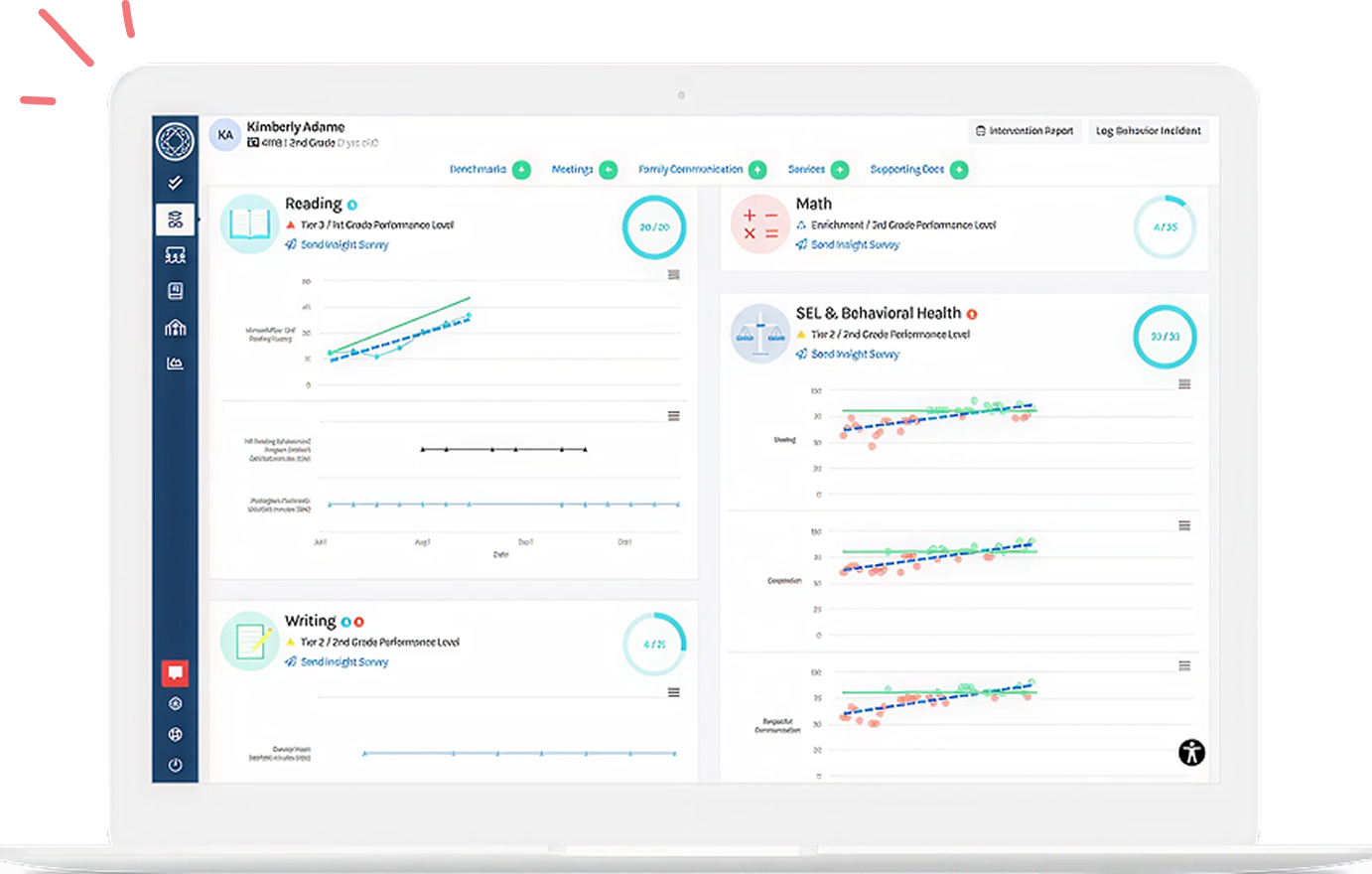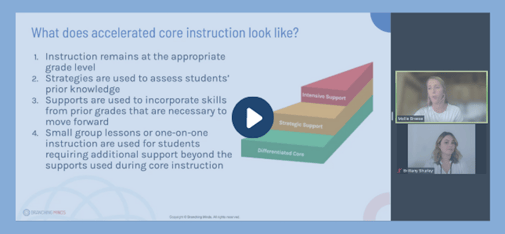In an effort to support the high rate of students who have experienced significant learning loss caused by remote learning and continued COVID 19-related instruction interruptions, Texas has recently passed House Bill 4545 (HB4545). This new statute outlines updated requirements for school districts to provide supplemental accelerated instruction for all students who do not meet grade-level requirements in the state’s standardized assessments.
Since this statute was enacted in the summer of 2021, school districts have quickly reacted and developed new procedures to ensure these requirements are met, and students are receiving the accelerated instruction they need. As many Texas Branching Minds partners have already discovered, Branching Minds is quickly adapting and providing districts the help they need to implement these crucial changes successfully.
Beginning in 3rd grade, all students in Texas public schools take the State of Texas Assessments of Academic Readiness (STAAR) in core subject areas. In high school, the assessment program changes to the STAAR End of Course (EOC) assessments, five of which are required for graduation. According to the Texas Education Agency, students who do not meet grade-level expectations in these assessments are unlikely to succeed in the next grade or course without significant, ongoing academic intervention.
The STAAR data from the most recent testing administration highlights the importance of immediate action towards supporting students. Among students tested in 2021, there was a 4% increase in students that did not meet their grade level in reading compared to 2019 and a 16% increase in students that did not meet their grade level in math (source). We do not have time to waste!
What Requirements Does HB4545 Establish?
For students who do not pass the STAAR test in grades 3-8 or the STAAR EOC assessments, school districts must provide support by either:
- Assigning the student to a classroom teacher who is a Teacher Incentive Allotment (TIA)-certified master, exemplary, or recognized teacher (a designation determined by the Texas Education Agency in conjunction with the teacher’s school district) or
- Providing supplemental instruction before or after school or embedded in the school day, without removing the student from their grade-level required core and enrichment courses
In addition, for students who do not meet STAAR math or reading grade-level expectations in grades 3, 5, or 8, an Accelerated Learning Committee (ALC) must now be established to develop an individual educational plan for the student and monitor progress.
Grade retention and retesting requirements in grades 5 and 8 have also now been eliminated.
What Are the Requirements for Supplemental Accelerated Instruction?
Accelerated instruction aims to ensure that all students have access and opportunity to participate in grade-level work that will prepare them to be successful during and after their years at school. As mentioned above, accelerated instruction is more important today than ever after students have experienced and continue to experience learning loss caused by remote learning and current learning interruptions resulting from districts aiming to minimize COVID-19 infections and placing exposed or sick students in quarantine.
HB4545 requires supplemental accelerated instruction for all students who did not pass the STAAR test or the STAAR EOC assessments and are not assigned to a TIA-certified master, exemplary, or recognized teacher. Districts must provide a minimum of 30 hours of supplemental instruction in the subject area for each test that the student failed to pass. Supplemental instruction must be:
- Delivered at least once per week in addition to instruction regularly provided to students in the grade level in which the student is enrolled
- Targeted to the essential knowledge and skills for the applicable grade levels and subject area
- Provided to a student individually or in a group of no more than three students (unless the parent or guardian authorizes a larger group) by a person with training in the instructional materials (should be the same person providing instruction to the extent possible)
If intervention time is not already built into the master schedule, districts can schedule time before school, after school, or during Saturday/Summer school for students. However, most districts find the easiest way to find time is to creatively build time into their master schedules.
➡️ Related Resource: Selecting the Right Interventions to Boost Accelerated Learning
Accelerated Learning Committees (ALCs)
Accelerated Learning Committees must meet for every student in grades 3, 5, and 8 who did not pass the math or reading STAAR test. ALCs should meet no later than the start of the subsequent school year and be comprised of:
- The principal or the principal’s designee (this can be another administrator or a lead teacher)
- The student’s parent or guardian, and
- The teacher of the subject of an assessment on which the student failed to perform satisfactorily
ALCs should develop an educational plan for each student, documented in writing and provided to the parent/guardian. The educational plan must include a progress monitoring plan to ensure the student is progressing. Progress monitoring should be appropriately scheduled (higher frequency for students with more intense goals) and assigned to an individual trained in the progress monitoring assessment (ideally the same teacher providing the accelerated instruction).
Suppose a student fails to perform satisfactorily on the next STAAR test in the same subject area. In that case, the superintendent (or the superintendent’s designee) should meet with the student’s ALC to determine any modifications that should be made to the student’s educational plan.
How Does Branching Minds Help Texas Districts With HB4545 Requirements?
Districts need an efficient way to track students needing accelerated instruction and/or ALCs. Campus and district staff should quickly be able to identify these students and track the intervention minutes that have been logged for each one. Most importantly, ALCs should be able to quickly determine intervention efficiency and use the problem-solving approach to edit educational plans as needed for each student.
Branching Minds supports our partners around the world with identifying students in need, creating individual and group support plans, and providing/documenting evidence-based interventions. In addition, through the use of our platform, Branching Minds supports seamless data collection for historical patterns and current decision-making. Here are some ways in which we are specifically helping our Texas partners as they implement HB4545:
Branching Minds and HB4545
|
STAAR data available in the platform: |
Teachers and staff can see a student’s historical STAAR data to make the best data-based decisions for each individual student. |
|
Help teachers and staff quickly identify students needing supplemental instruction and accelerated learning committees: |
Branching Minds supports flagging which students need supplemental instruction and/or accelerated learning committees with custom tags, so everyone at a campus or district can quickly filter and find which students need this support. |
|
Efficiently document decisions made by the Accelerated Learning Committee: |
ALC meeting templates are uploaded and generated; parent/guardian communications, meeting notes, and decisions can be documented efficiently. |
|
Educational plans established by the ALC can be documented and monitored with ease and efficiency: |
Individual or group plans including a SMART goal, a progress monitor, and an intervention or support can be quickly and easily created within the platform. |
|
Teachers can quickly document intervention minutes for each individual or group: |
Teachers or staff tasked with working with an individual or a group will receive weekly reminders to check off intervention minutes and input progress monitoring data. |
|
Intervention minutes report helps track the minutes that have been logged for students: |
Branching Minds provides reports to track intervention minutes logged for students to ensure no students are missed or “slip through the cracks.” |
While some districts have found some of these new requirements difficult to manage, Branching Minds helps make the process much easier for teachers and administrators, as illustrated in the chart above. Regardless of HB4545, it is always a best practice to provide differentiated instruction and individualized support plans to all students identified as needing support at the end of the day.
For more information on how the Branching Minds platform can specifically support your district initiatives, request a demo!
On-demand webinar on accelerated learning:
Recharging Core Instruction and MTSS
In this webinar, we unpack the significance of “recharging” core instruction in an MTSS framework to match accelerated learning needs, especially following such a tumultuous year. We focus on specific strategies for accelerating learning, review key concepts, and stress the importance of reframing discussions on “learning loss.”
The most comprehensive and instructive library of evidence-based learning supportsBranching Minds has the most comprehensive and instructive library of evidence-based learning supports of any MTSS platform. Our supports include hundreds of paid evidence-based intervention programs, as well as nearly a thousand free evidence-based strategies, activities, and resources. For each of these supports, BRM helps educators understand what the support is, why and for whom it should be used, how it should be delivered, and connects them to the supporting research and additional material. Our learning science team has curated these resources from the most trusted and respected hubs of evidence-based supports, including the Florida Center for Reading Research, What Works Clearinghouse, Evidence for ESSA, Intervention Central, the IRIS Center from Vanderbilt University, Harmony SEL; and, each one has been reviewed and categorized based on the ESSA tiers of evidence guidelines. Want to learn more?
|
![[Guest Author] Katya Henderson-avatar](https://www.branchingminds.com/hs-fs/hubfs/Team/Katya%20(1)-2.jpeg?width=82&height=82&name=Katya%20(1)-2.jpeg)
About the author
[Guest Author] Katya Henderson

Your MTSS Transformation Starts Here
Enhance your MTSS process. Book a Branching Minds demo today.


















.png?width=716&height=522&name=Tier%203%20Behavior%20Support%20Planning%20(preview).png)
.png?width=716&height=522&name=Understanding%20Literacy%20Basics%20(Preview).png)